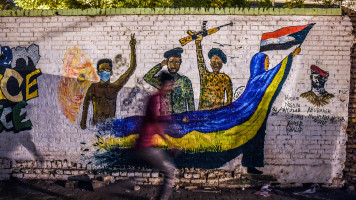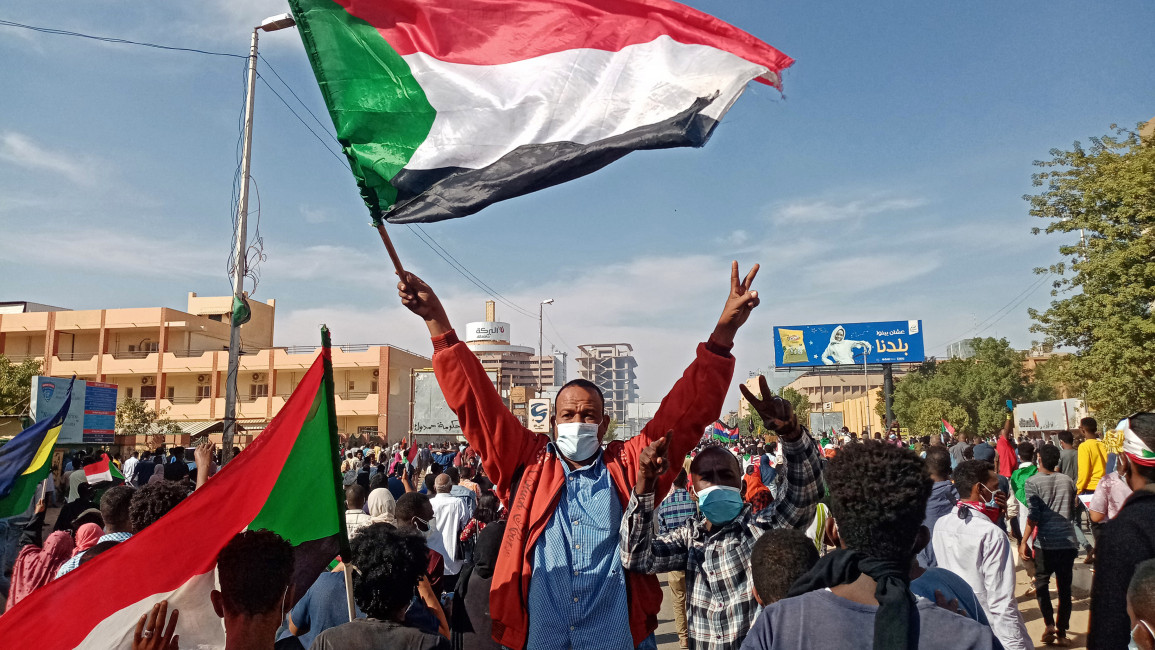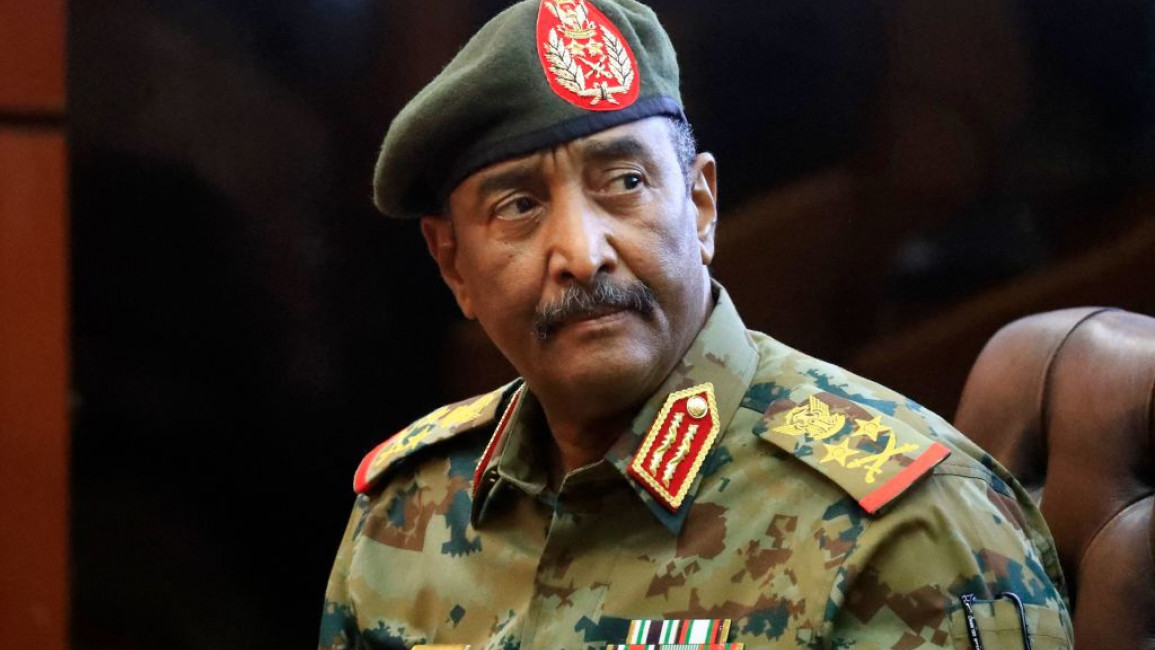
Analysis
Giorgio Cafiero
02 May, 2023
Analysis: Israel and the US's desire to consolidate Khartoum's position in the Abraham Accords has emboldened militaristic authoritarianism in Sudan, rather than a civilian-led democratic transition.
Since Sudan’s crisis erupted last month, concerns about state collapse and civil war have been valid.
Unfortunately, with General Abdel Fattah al-Burhan of Sudan’s national army and Mohamed Hamdan Dagalo (a.k.a. Hemedti) of the Rapid Support Forces (RSF) viewing this conflict as existential, it is not easy to imagine a de-escalation at any point soon.
There is also much to say about the role of outside actors seeking to influence Sudan’s crisis and fears of this violence quickly regionalising.
One country which is not necessarily playing a central role in the conflict but has its own vested interests and agendas in Sudan is Israel.
"Israel is deeply committed to ensuring that the military, whether its Hemedti or Burhan or some combination of the two - dominate the politics of Sudan"
There are various Israeli interests at stake in Sudan. The most important one has to do with Sudan’s place in the Abraham Accords.
Following in the United Arab Emirates (UAE) and Bahrain’s footsteps, Sudan announced its decision to, at least partly, join the Abraham Accords in October 2020.
Now Tel Aviv wants to see Khartoum’s entry into the normalisation camp solidify. Ultimately, Israel is committed to trying to ensure that whoever comes out on top in Sudan’s ongoing power struggle will be sympathetic to Tel Aviv and the Israeli government’s way of looking at the Arab world.
The majority of Sudanese citizens are against normalisation of relations with Israel, which is a major factor. This gives Israel vested interests in a military regime governing Sudan.
Analysis Lara Gibson
“Israel is deeply committed to ensuring that the military, whether its Hemedti or Burhan or some combination of the two - dominate the politics of Sudan,” Dr Nader Hashemi, the director of the Center for Middle East Studies at the University of Denver's Josef Korbel School of International Studies, told The New Arab.
Why Israel would like to prevent democratic development in Sudan and other Arab countries is not difficult to understand.
“Israel wants to have diplomatic relations with as many Arab states as possible. It cannot have diplomatic relations with democracies in the Arab world because democracies in the Arab world will demand that Israel make concessions to the Palestinians as a condition for diplomatic relations. That’s something that Israel refuses to do,” explained Dr Hashemi.
“Thus, Israel is deeply committed to preserving the authoritarian political order in the Arab world and that applies to Sudan as well.”

The majority of Sudanese citizens are against normalisation of relations with Israel. [Getty]
But some experts argue that Sudan’s military leadership will have a challenging time solidifying Khartoum in the Abraham Accords camp.
“Even the generals are not confident in their ability to deliver this to Israel, as large factions of their own supporters staunchly oppose making peace with Israel,” said Sarah Leah Whitson, the Executive Director of Democracy for the Arab World Now (DAWN), in an interview with TNA.
“Given that Burhan and Hemedti lack domestic legitimacy, their relationship with Israel could be used against them,” Dr Aziz Alghashian, a fellow at the Arab Gulf States Institute in Washington, told TNA.
“Both military generals and Sudan’s newly official relations with Israel are not overly popular with the Sudan public. Therefore, Israel understands that its relations with Sudan in its current form is very precarious.”
"Israel is deeply committed to preserving the authoritarian political order in the Arab world and that applies to Sudan as well"
A mediation role?
Since Sudan’s conflict erupted last month, Israel has offered to mediate between Burhan and Hemedti. Although doubtful that Tel Aviv would play this role, Israel trying to present itself as a credible and legitimate mediator in Sudan’s conflict is indicative of its relationships with both Sudanese warlords.
Ultimately, Israel seems willing to work with either Burhan or Hemedti should either emerge triumphant in this ongoing crisis.
“I think Israel is not backing one side or the other,” Dr Hashemi told TNA. “It has investments in both of these military gangsters, and it wants to ensure that, whoever prevails, Israel will have good relationships with General Burhan of the Sudanese army or Hemedti.”
Israel’s security establishment is not united on the conflict in Sudan. The country’s foreign ministry joined Egypt in being more in favour of Burhan while the Mossad, like the UAE and Libya’s Khalifa Haftar, has deep ties with Hemedti.
But some experts argue that Sudan’s military leadership will have a challenging time solidifying Khartoum in the Abraham Accords camp.
“Even the generals are not confident in their ability to deliver this to Israel, as large factions of their own supporters staunchly oppose making peace with Israel,” said Sarah Leah Whitson, the Executive Director of Democracy for the Arab World Now (DAWN), in an interview with TNA.
“Given that Burhan and Hemedti lack domestic legitimacy, their relationship with Israel could be used against them,” Dr Aziz Alghashian, a fellow at the Arab Gulf States Institute in Washington, told TNA.
“Both military generals and Sudan’s newly official relations with Israel are not overly popular with the Sudan public. Therefore, Israel understands that its relations with Sudan in its current form is very precarious.”
"Israel is deeply committed to preserving the authoritarian political order in the Arab world and that applies to Sudan as well"
A mediation role?
Since Sudan’s conflict erupted last month, Israel has offered to mediate between Burhan and Hemedti. Although doubtful that Tel Aviv would play this role, Israel trying to present itself as a credible and legitimate mediator in Sudan’s conflict is indicative of its relationships with both Sudanese warlords.
Ultimately, Israel seems willing to work with either Burhan or Hemedti should either emerge triumphant in this ongoing crisis.
“I think Israel is not backing one side or the other,” Dr Hashemi told TNA. “It has investments in both of these military gangsters, and it wants to ensure that, whoever prevails, Israel will have good relationships with General Burhan of the Sudanese army or Hemedti.”
Israel’s security establishment is not united on the conflict in Sudan. The country’s foreign ministry joined Egypt in being more in favour of Burhan while the Mossad, like the UAE and Libya’s Khalifa Haftar, has deep ties with Hemedti.
Analysis Nour Odeh
Cairo and Abu Dhabi supporting opposing sides in Sudan’s conflict makes Israel less likely to fully back either Burhan or Hemedti, which helps explain why Tel Aviv is trying to present itself as a potential mediator.
The Israelis offering to mediate in Sudan’s conflict also speaks to Tel Aviv’s wider interests in other parts of Africa near Sudan, even if the idea of Israel playing this diplomatic role can’t be taken seriously.
“Israel has offered itself up as a mediator for the conflict between the Sudanese generals, boasting about its ties to both men, but no one takes this rather laughable proposal seriously,” Whitson said in a TNA interview.
“It is suggestive, however, of Israel’s goals to expand its political, economic, and military presence in East Africa. That’s why it has also offered to mediate between Ethiopia, Sudan, and Egypt about the Great Dam and conflicts over water, but again, no one takes this seriously.”

For Washington, achieving the goal of pushing Sudan toward formalised relations with Israel required US support for the Sudanese military playing a central role in the country's transition. [Getty]
US foreign policy
Analysing Israeli-Sudanese relations and Khartoum’s place in the Abraham Accords requires taking stock of Washington’s foreign policy.
Throughout the Trump and Biden presidencies, US policies vis-à-vis Sudan have not been oriented around promoting any successful democratic transition. Instead, they have been geared toward ensuring that the military can maintain stability at home and bring Khartoum into the normalisation camp.
“The political turbulence of the military junta in Sudan, and, in particular, its desperation to stay in power was an opportunity for the US to use its leverage in order for Sudan to join the Abraham Accords,” explained Dr Alghashian.
"Throughout the Trump and Biden presidencies, US policies vis-à-vis Sudan have not been oriented around promoting any successful democratic transition"
“We see how the focus of US foreign policy in Sudan was not the suffering and the socio-economic and political concerns of 45 million Sudanese. It was very much preserving the authoritarian order in the Arab world. A lot of energy coming from the US with respect to Sudan policy was geared toward getting Sudan to establish diplomatic relations with Israel,” explained Dr Hashemi.
“What’s more disturbing is the extent to which the US government aided and abetted military control in Sudan and literally bribed Sudan with removal from the US terrorism list for the sole and exclusive purpose of securing the initial sign-off on the Abraham Accords in 2020, serving Israel’s interest, but not America’s or Sudan’s,” Whitson told TNA.
Washington achieving this goal of pushing Sudan toward formalised relations with Israel required US support for the Sudanese military playing a central role in the country’s transition amid the post-Bashir era.
US foreign policy
Analysing Israeli-Sudanese relations and Khartoum’s place in the Abraham Accords requires taking stock of Washington’s foreign policy.
Throughout the Trump and Biden presidencies, US policies vis-à-vis Sudan have not been oriented around promoting any successful democratic transition. Instead, they have been geared toward ensuring that the military can maintain stability at home and bring Khartoum into the normalisation camp.
“The political turbulence of the military junta in Sudan, and, in particular, its desperation to stay in power was an opportunity for the US to use its leverage in order for Sudan to join the Abraham Accords,” explained Dr Alghashian.
"Throughout the Trump and Biden presidencies, US policies vis-à-vis Sudan have not been oriented around promoting any successful democratic transition"
“We see how the focus of US foreign policy in Sudan was not the suffering and the socio-economic and political concerns of 45 million Sudanese. It was very much preserving the authoritarian order in the Arab world. A lot of energy coming from the US with respect to Sudan policy was geared toward getting Sudan to establish diplomatic relations with Israel,” explained Dr Hashemi.
“What’s more disturbing is the extent to which the US government aided and abetted military control in Sudan and literally bribed Sudan with removal from the US terrorism list for the sole and exclusive purpose of securing the initial sign-off on the Abraham Accords in 2020, serving Israel’s interest, but not America’s or Sudan’s,” Whitson told TNA.
Washington achieving this goal of pushing Sudan toward formalised relations with Israel required US support for the Sudanese military playing a central role in the country’s transition amid the post-Bashir era.
In-depth Jonathan Fenton-Harvey
In terms of US interests in Sudan in this current period, “the objective was much more regional and supporting the relationship between Israel and Arab authoritarian regimes,” according to Dr Hashemi.
“That was the dominant entry point. That is an important point that has been lost in the debate on Sudan recently, and the failure of national policy that has contributed to the crisis that is unfolding before us.”
The Western mainstream media has been heavily focusing on Russia’s ties to Sudanese actors. But there has been hardly any serious discussion about how Israel and the US’s desire to consolidate Khartoum’s position in the Abraham Accords have emboldened militaristic authoritarianism in the country.
This point must be considered when assessing the various factors and events that led to Sudan’s ongoing crisis.
Giorgio Cafiero is the CEO of Gulf State Analytics.
Follow him on Twitter: @GiorgioCafiero
No comments:
Post a Comment